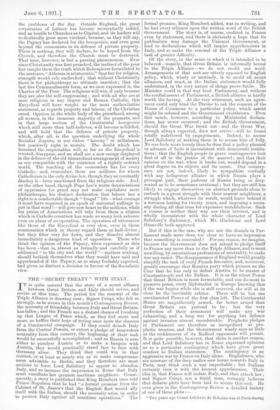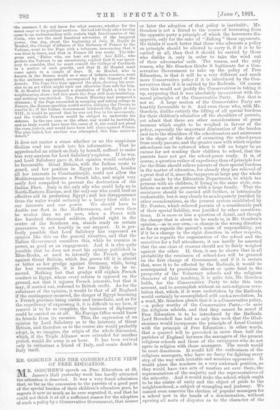THE "SECRET TREATY" WITH ITALY.
IT is quite natural that the story of a secret alliance between Great Britain and Italy should revive, and revive at this time. The period, for the renewal of the Triple Alliance is drawing near ; Signor Crispi, who felt so strongly, as he avows in this month's Contemporary Review, the necessity of friendship between Italy and Great Britain, has fallen ; and the French see a distant chance of Freaking up that League of Peace which, as they feel more and more, so baffles their hope of trying once more the chances of a Continental campaign. If they could detach Italy from the Central Powers, or extort a pledge of benevolent neutrality from this country, the beginning of their task would be successfully accomplished ; and as Russia is sure either to paralyse Austria or to make a bargain with Austria, they would practically stand face to face with Germany alone. They think they could win in that contest, or at least so nearly win as to make compromise seem advisable to Berlin, and they therefore are most anxious to force Lord Salisbury to appear to abandon Italy, and so increase the impression in Rome that Italy must conciliate her greatest maritime neighbour. Conse- quently, a story is published that King Humbert once told Prince Napoleon that he had "a formal promise from the Cabinet of St. James's that the English fleet would ally itself with the Italian, should the necessity arise, in order to protect Italy against all maritime operations." The formal promise, King Humbert added, was in writing, and he had every reliance upon the written word of the British Government. The 'story is, of course, credited in France even by statesmen, and there is obviously a hope that its publication may damage the Unionist Government, or lead to declarations which will inspire apprehensions in Italy, and so make the renewal of the Triple Alliance a task of greater difficulty.
Of the story, in the sense in which it is intended to be believed—namely, that Great Britain is informally bound to the Triple Alliance—we do not credit one word. Arrangements of that sort are utterly opposed to English policy, which, wisely or unwisely, is to avoid all secret alliances, and must, as the Italian statesmen would fully understand, in the very nature of things prove futile.. No Minister could in that way bind Parliament, and without the cordial assent of Parliament, a British alliance is hardly worth the having. At the very uttermost, such an agree- ment could only bind the Throne to ask the consent of the House of Commons to a particular policy, which assent might be refused and the Government overthrown. Even this much, however, according to Ministerial declara- tions, has never occurred ; and the British Government, should the Great War break out—and the Great War, though always expected, does not arrive—will be found totally unfettered by engagements. Indeed, to accuse Lord Salisbury of making them is to accuse him of folly. No one feels more keenly than he does that a policy planned in advance of facts is inconsistent with democratic institu- tions ; that the English people in grave contingencies look first of all to the justice of the quarrel ; and that their opinion on the war, when it broke out, would depend in a great degree on its objects and its cause. Our country- men are not, indeed, likely to sympathise cordially with any belligerent alliance in which Russia plays a principal part, their jealousy of Russia being so deep- seated as to be sometimes irrational ; but they are still less likely to engage themselves on abstract grounds alone to embark in a great struggle with their nearest neighbour, a struggle which, whatever its result, would leave behind it a soreness lasting for twenty years, and imposing a neces- sity during all that time for expensive watchfulness. Such a course is neither their way nor their interest, and is wholly inconsistent with the whole character of Lord Salisbury's diplomacy, which Mr. Gladstone and Lord Granville both approved.
But if this is the case, why are not the denials in Par- liament made more clear, too clear to leave an impression that something is concealed P For one reason, we imagine, because the Government does not intend to pledge itself to France any more than to the Triple Alliance, and is most unwilling, by ostentatious professions of neutrality, to make war any easier. The disappearance of England would greatly simplify the task of every French fire-eater, and, moreover, greatly encourage that Russian party which presses on the Czar that he has only to defeat Austria to be master of Constantinople and the Balkan. It is as the silent Power that Great Britain is most formidable, and can. do most to preserve peace, every diplomatist in Europe knowing that if the war begins while she is still reserved, she will at its close be the inevitable arbiter. There will be but one unexhausted Power of the first class left. The Continental States are magnificently armed, far better armed than Great Britain can pretend to be ; but the very perfection of their armament will make any war exhausting, and a long war for anything but defence against invasion almost unendurable. Prophetic pledges in Parliament are therefore as inexpedient as pro- phetic treaties, and the Government wisely says as little as the recklessness of its Radical opponents will permit. It is quite possible, however, that there is another reason, and that Lord Salisbury has in Rome expressed opinions as to a particular contingency which have given great comfort to Italian statesmen. The contingency is an aggressive war by France on Italy alone. Englishmen, who are unaware of the deep malice now borne towards Italy in Paris, may think such a war improbable ; but Italians certainly view it with the keenest apprehension. Their idea is, that France will isolate Italy, and then attack her ; and Signor Crispi, not a timid man, certainly believes that definite plots have been laid to secure this end. He even gives in the Contemporary Review a detailed history of one of these plots :— "Two years ago Count Lefebvre de Behaine was at Paris during the summer, I do not know for what reasons, whether for the MUGU congo or for political motives. He had left Italy after having come to an understanding with certain high functionaries of the Curia, who are the most fanatical advocates of the temporal power. One day, about the beginning of July, M. Baylin de Monbel, the Chargé d'Affaires of the Embassy of France to tho Vatican, went to the Pope with a telegram, announcing that it was time to leave, and that in France all was ready. The tele- gram said,'Faiths vite, car tout eat prat.' Leo XIII., who prefers the Vatican to an uncertainty, replied that it was neces- sary to consider, that he must consult the College of Cardinals in a matter of such gravity, and that M. de Monbel must come again in a couple of days. M. de Monbel, who is known in the Roman world as a man of infinite resource, went to the audience appointed, accompanied by the General of the Jesuits. The Pope this time opposed the plan, showing his aver- sion to an act which might turn out otherwise than safe for him. M. do Monbel then proposed a simulation of flight, a trip to a neighbouring shore ; but this made the Pope still more hesitating, and nothing was decided. The French Ministry had prepared a dilemma : if the Pope succeeded in escaping and taking refuge in France, the Roman question would revive, obliging the Powers to resolve it ; if the Italian Government hindered the flight of Leo it would be proved that he was not free in his movements, and the Catholic Powers would be obliged to undertake his defence. In the one case or the other, war would be inevitable, and as Italy would have been the cause of it, she could not plead the casus icaderis, and would have been left alone against France. The plan failed, but another was attempted, this time easier to detect."
It does not matter a, straw whether or no the suspicious Sicilian read too much into his information. That he apprehended an attack on Italy by herself, sufficed to make him very anxious for Lord Salisbury's opinion. If he was, and Lord Salisbury gave it, that opinion would certainly be favourable. Great Britain, with the Indian route to guard, and her position in Egypt to protect, besides all her interests in Constantinople, could not allow the Mediterranean to become a French lake, and might very easily feel compelled to prevent the destruction of the Italian Fleet. Italy is the only ally who could help us in South-Eastern Europe, and the only one who could lend us effective aid in protecting Egypt ; and her disappearance from the water would certainly be a heavy blow alike to our interests and our power. We should have to double our fleet in the Mediterranean, and even then be weaker than we are now, when a Power with five hundred thousand soldiers, planted right in the centre of the Southern sea, stands ready on certain guarantees to act heartily in our support. It is per- fectly possible that Lord Salisbury has expressed an opinion like this on the general situation, and that the Italian Government considers this, while he remains in power, as good as an engagement. And it is also quite possible that he does not want his opinion published in Blue-Books, or used to intensify the French grudge against Great Britain, which has grown till it is almost as bitter as her grudge against Germany, while, being far less reasonable, it is far less likely to be re- moved. Nothing but that grudge will explain French conduct in Egypt, where every reform is opposed on the ground, not that it injures French interests, but that it may, if carried out, redound to British credit. As for the substance of the opinion, it would be that of all Englaud if the contingency occurred, the danger of Egypt becoming a French province being visible and immediate, and as for the expediency of expressing it, it is difficult to see how, if reserve is to be so complete, the business of diplomacy could be carried on at all. No Foreign Office would know its feiends from its enemies. This, the expression of an opinion by Lord Salisbury as to the interests of Great Britain, and therefore as to the course she would probably adopt, is, we imagine, the origin of the whole discussion, which, if the Triple Alliance were .extended for another period, would die away in an hour. It has been revived only to embarrass a friend of Italy, and create doubt in Italy itself.







































 Previous page
Previous page